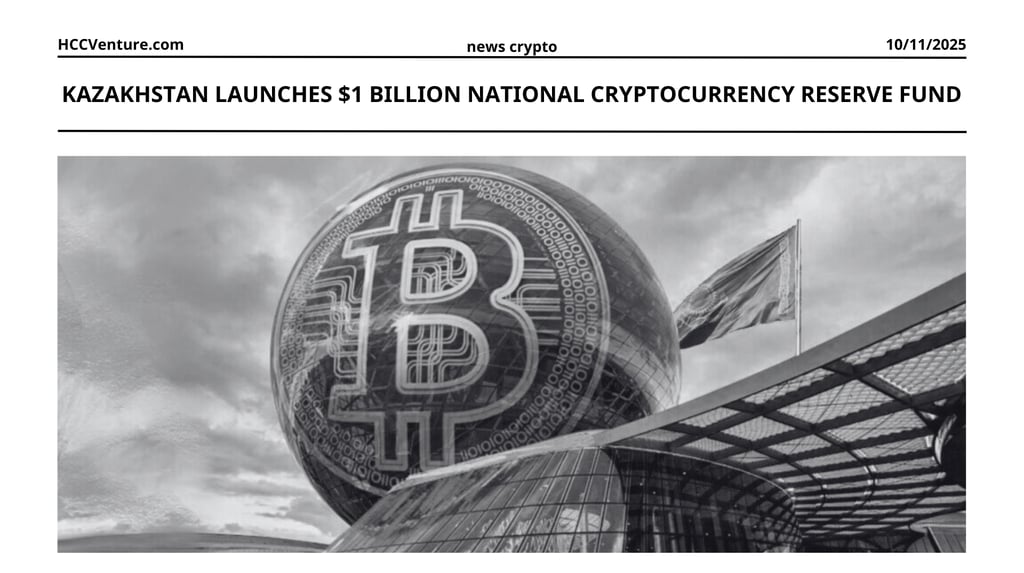Kazakhstan Launches $1 Billion National Cryptocurrency Reserve Fund
A national cryptocurrency reserve fund worth between $500 million and $1 billion, expected to launch in early 2026 and invested with confiscated assets, mining revenues and repatriated funds.
11/10/20252 min read


The Race for a National Cryptocurrency Treasury
Kazakhstan is making a decisive move into digital assets with plans to create a national cryptocurrency reserve fund worth between $500 million and $1 billion by early 2026, according to government sources with knowledge of the proposal.
The initiative aims to position Kazakhstan as Central Asia’s key hub for sovereign digital asset investment and blockchain innovation, in line with the country’s broader economic diversification strategy and growing focus on digital financial infrastructure.
Kazakhstan's strategic goals
The initiative will be jointly overseen by the National Bank of Kazakhstan (NBK), the Ministry of Digital Development, and the Astana Financial Services Authority (AFSA). The proposed National Cryptocurrency Reserve Fund (NCRF) will serve several roles:
Diversifying National Reserves – Kazakhstan seeks to balance its dependence on traditional reserves such as gold and foreign currencies with Bitcoin, Ethereum and several stable cryptocurrencies, viewing digital assets as long-term strategic holdings.
Institutional Investment Vehicle – The Fund will participate in blockchain infrastructure, mining and crypto asset projects, both domestically and internationally.
Monetary Policy Innovation – NCRF will also explore the integration of tokenized government bonds and digital tenge reserves (CBDC), potentially creating a bridge between central bank-backed currencies and decentralized digital liquidity.
Officials describe the fund as “ a digital complement ” to Kazakhstan’s National Oil and Gas Fund, reflecting a policy shift from reliance on raw resources to digital capital accumulation.
Economic and geopolitical context
Kazakhstan’s move comes amid an increasingly competitive global race for state-backed cryptocurrency reserves. Countries like El Salvador and Bhutan have incorporated Bitcoin into their national strategies, while Singapore, the UAE and Hong Kong are exploring hybrid digital asset reserve models.
For Kazakhstan, the initiative builds on its established presence in the cryptocurrency mining industry – which once accounted for more than 15% of the global Bitcoin hashrate. After tightening environmental and tax policies in 2023, the government is now shifting from being a mining host to becoming a strategic investor in digital assets.
Economists argue that a sovereign cryptocurrency fund could improve:
Flexibility of foreign exchange reserves
Modernizing the financial system
Regional competitiveness in fintech and digital banking.
The fund is also expected to complement the ongoing work on Digital Tenge, the country’s central bank digital currency (CBDC), by establishing a clear link between public blockchain assets and state-issued digital currencies.
Disclaimer: The information presented in this article is the author's personal opinion in the cryptocurrency field. It is not intended to be financial or investment advice. Any investment decision should be based on careful consideration of your personal portfolio and risk tolerance. The views expressed in this article do not represent the official position of the platform. We recommend that readers conduct their own research and consult with a professional before making any investment decisions.
Explore HCCVenture group
HCCVenture © 2023. All rights reserved.

Connect with us
Popular content
Contact to us
E-mail : sp_contact@hccventure.com
Register : https://linktr.ee/holdcoincventure
Disclaimer: The information on this website is for informational purposes only and should not be considered investment advice. We are not responsible for any risks or losses arising from investment decisions based on the content here.


TERMS AND CONDITIONS • CUSTOMER PROTECTION POLICY
ANALYTICAL AND NEWS CONTENT IS COMPILED AND PROVIDED BY EXPERTS IN THE FIELD OF DIGITAL FINANCE AND BLOCKCHAIN BELONGING TO HCCVENTURE ORGANIZATION, INCLUDING OWNERSHIP OF THE CONTENT.
RESPONSIBLE FOR MANAGING ALL CONTENT AND ANALYSIS: HCCVENTURE FOUNDER - TRUONG MINH HUY
Read warnings about scams and phishing emails — REPORT A PROBLEM WITH OUR SITE.
